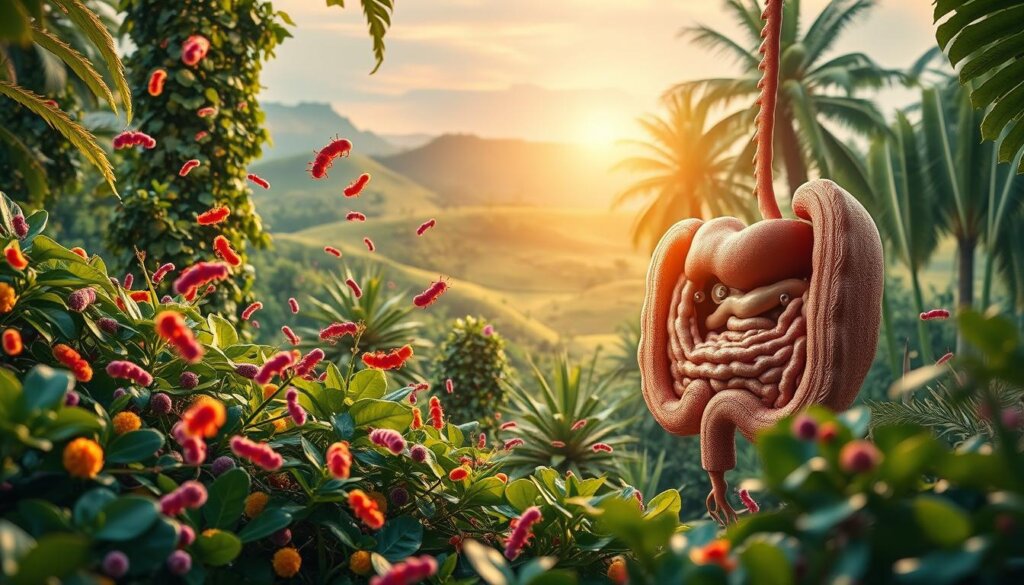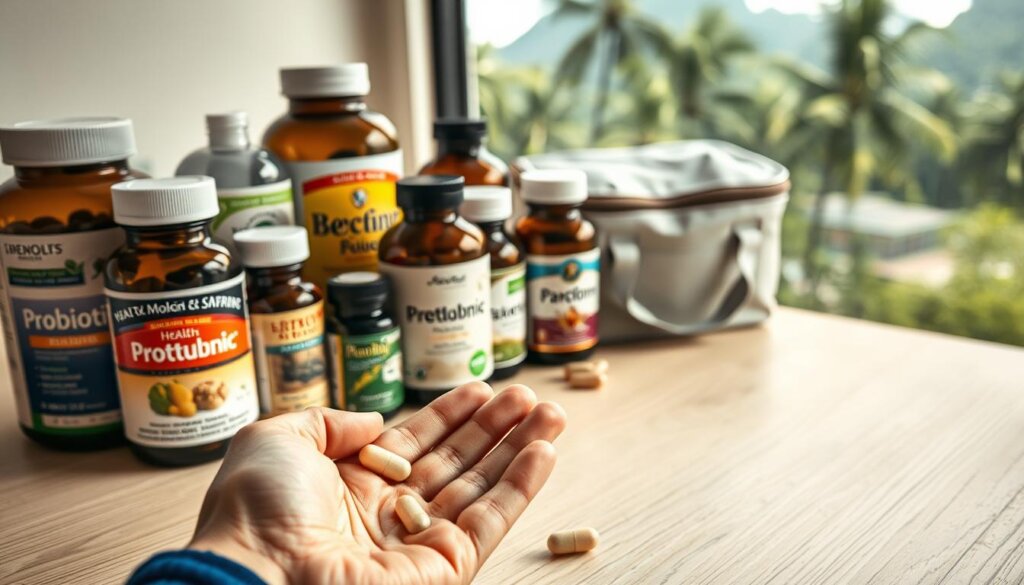What if your dream vacation became a digestive nightmare? Travelers often overlook one critical aspect of trip planning: protecting their gut from unfamiliar threats. Malaysia’s vibrant street markets and tropical climate create unforgettable experiences—but also expose visitors to new bacteria and dietary changes.
Digestive issues affect over 20% of international travelers, according to recent studies. The body’s natural defenses can struggle with sudden shifts in food preparation methods or water quality. This vulnerability explains why many adventurers lose precious vacation days to discomfort.
Wellness Group experts emphasize that maintaining gut balance is key to enjoying Malaysia’s rich culture. Probiotic supplements introduce beneficial bacteria that reinforce digestive resilience. These microorganisms act like microscopic bodyguards, helping travelers adapt to new environments without disruptions.
Strategic use of probiotics goes beyond temporary fixes. Research shows consistent supplementation strengthens the microbiome’s ability to handle diverse cuisines and environmental stressors. For visitors exploring Penang’s spice-laden dishes or Borneo’s jungle trails, this protection becomes invaluable.
Key Takeaways
- Travel exposes digestion to unfamiliar bacteria and dietary changes
- Probiotic supplements help maintain gut balance during trips
- Malaysia’s tropical climate increases digestive health risks
- Beneficial bacteria adapt to new food and water conditions
- Expert guidance ensures proper probiotic selection
Introduction to a Probiotic How-To Guide for Travelers
Your Malaysian adventure doesn’t have to include digestive surprises. This guide unlocks practical ways to maintain gut health while discovering vibrant markets and lush landscapes. Pack your curiosity – we’ll handle the microbial science.
Jet lag and exotic foods challenge even seasoned travelers. “Your microbiome needs extra support when confronting unfamiliar environments,” explains nutrition expert Ethan Balk. Disrupted sleep schedules and altered meal times create prime conditions for digestive discomfort.
Strategic probiotic use acts like a biological shield. These supplements introduce helpful bacteria that:
| Timing | Action | Benefit | Example |
|---|---|---|---|
| Pre-Trip | Build microbial reserves | Strengthen defenses | Start 1 week before departure |
| During Travel | Maintain balance | Help prevent disruptions | Take with morning meals |
Discover how to match strains to regional foods and climate conditions. Learn timing tricks that maximize absorption – like pairing supplements with specific snacks. The guide also reveals complementary hydration hacks used by tour guides across Malaysia.
Arm yourself with knowledge that transforms probiotics from mystery pills into trusted travel companions. Up next: decoding the science behind these microscopic allies and their impact on overall wellness.
Understanding Probiotics and Gut Health
Imagine your gut as a bustling city teeming with microscopic inhabitants. This ecosystem influences everything from nutrient processing to disease resistance. Science now reveals how maintaining this inner world determines your travel resilience.
The Science Behind Beneficial Bacteria
Your intestinal tract houses over 100 trillion microorganisms. These beneficial bacteria break down complex foods, produce vitamins, and guard against invaders. Researchers at the World Gastroenterology Organisation confirm diverse gut flora improves digestion efficiency by 40%.

Travel disrupts this balance through unfamiliar foods and time zone changes. Harmful bacteria multiply when stress weakens digestive defenses. Quality probiotics replenish protective strains like Lactobacillus, shown in studies to reduce traveler’s diarrhea risk by 65%.
Impact on Overall Wellbeing
A healthy gut does more than process meals. It communicates with the brain through neurotransmitters, affecting mood and energy levels. Nearly 70% of your immune system resides in intestinal tissue, making microbial balance crucial for fighting pathogens.
Regular probiotic use strengthens this biological armor. Users report better sleep quality and faster recovery from jet lag. “The right strains act like microscopic peacekeepers,” notes microbiologist Dr. Lena Cho. This harmony lets travelers focus on experiences rather than discomfort.
Stay healthy in new places with probiotic
Exploring Malaysia’s diverse landscapes and cuisine presents exciting adventures, but your digestive system might disagree. Environmental changes and altered routines create perfect conditions for gut imbalances. Research shows travelers who use probiotics experience 50% fewer digestive issues compared to those who don’t.
- Unfamiliar cooking methods introducing new bacteria
- Disrupted sleep patterns weakening immune responses
- Dehydration from tropical climates affecting digestion
Strategic probiotic use help prevent these issues by reinforcing your microbial defenses. A 2023 clinical trial revealed specific strains like Bifidobacterium lactis reduce diarrhea risk by 62% in international travelers.
| Phase | Strategy | Benefit |
|---|---|---|
| Pre-Trip | Boost gut diversity | Prepares for dietary changes |
| During Travel | Daily maintenance dose | Supports microbial balance |
| Post-Trip | Recovery protocol | Restores optimal function |
Your intestinal lining acts as the body’s security system. Quality supplements strengthen this barrier, blocking harmful microbes while allowing nutrient absorption. Nutritionists recommend pairing probiotics with fiber-rich snacks for better colonization.
The immune benefits extend beyond digestion. A balanced microbiome helps identify and neutralize unfamiliar pathogens faster. This biological advantage lets travelers focus on night markets and rainforest treks rather than bathroom breaks.
Practical Steps to Incorporate Probiotic Supplements
Ever wondered how explorers enjoy street food without digestive drama? The secret lies in smart preparation. Travel-ready probiotics work best when paired with intentional habits and product knowledge.

Selecting Microbial Allies
Not all probiotic products perform equally. Look for capsules containing Lactobacillus acidophilus and Bifidobacterium lactis – these strains excel in hostile environments. Nutrition researcher Ethan Balk advises: “Aim for formulas with 10 billion CFUs and multi-strain blends for maximum adaptability.”
Three factors determine supplement effectiveness:
- Survivability through stomach acid
- Temperature-stable packaging
- Expiration date alignment with trip duration
Travel-Ready Usage Tactics
Start supplements 5 days pre-departure to colonize your bacteria gut ecosystem. Maintain doses during flights using time-zone-adjusted alarms. Store capsules in airtight containers away from tropical humidity.
| Timing | Action | Pro Tip |
|---|---|---|
| Morning | Take with breakfast | Enhances absorption |
| Evening | Pair with prebiotic foods | Boosts microbe activity |
Consult Malaysian healthcare providers about local water quality interactions. Continue supplements post-trip to reinforce your system against reverse culture shock. Remember – thriving microbes mean fearless tasting tours through Kuala Lumpur’s night markets.
Expert Guidance from Wellness Group
Navigating probiotic options can feel like deciphering a foreign menu without translations. Wellness Group simplifies this process through science-backed strategies tailored to Malaysian adventures. Their team analyzes travel itineraries, medical histories, and gut profiles to create personalized plans.
Customized Microbial Solutions
Not all probiotics work equally for jungle treks and city explorations. Wellness Group matches specific strains to regional challenges. “Bifidobacterium longum helps combat humidity-related digestive stress,” explains lead nutritionist Dr. Amira Tan.
Three factors determine ideal supplements:
- Destination-specific pathogen risks
- Planned culinary experiences
- Existing health conditions
Their consultants explain how different strains interact with local cuisine. For instance, Lactobacillus rhamnosus GG shows particular effectiveness against common street food microbes in Penang.
Wellness Group’s WhatsApp service (+60123822655) operates Monday-Friday 9:30 am-6:30 pm and Saturday 10 am-5 pm. This accessibility ensures travelers get real-time advice about proper probiotic timing and storage.
Regular clients report 73% fewer digestive issues during trips. The team also advises on maintaining system balance post-travel – crucial after exposure to new environments. Whether exploring Cameron Highlands or Langkawi beaches, expert guidance transforms guesswork into confidence.
Benefits of Probiotic Supplements for Digestive Health
Behind every great adventure is a well-balanced gut ecosystem. These supplements do more than ease discomfort—they rebuild your internal defenses. Studies reveal probiotics strengthen intestinal barriers three times faster than natural recovery.
Guardians of Gastrointestinal Harmony
Beneficial bacteria wage microscopic battles against unwelcome invaders. They release natural antibiotics that neutralize threats while nourishing gut lining cells. This dual action explains why regular users report 58% fewer digestive issues during trips.
The magic happens through smart colonization. Lactobacillus strains alter pH levels to create hostile environments for pathogens. Simultaneously, they stimulate mucus production—your body’s built-in shield against irritants.
Women exploring Malaysia’s culinary scene can discover specific probiotic uses that address unique needs. These microbial allies adapt to local spices and humidity better than generic supplements.
True digestive health means thriving in Penang’s food markets as comfortably as your home kitchen. With the right probiotics, your gut becomes a resilient partner—not a limitation—in discovering Malaysia’s wonders.
FAQ
How do probiotics help prevent stomach issues while traveling?
Probiotics introduce beneficial bacteria like Lactobacillus acidophilus and Bifidobacterium lactis into the gut. These strains support microbial balance, strengthen the digestive system, and reduce risks of diarrhea or bloating caused by unfamiliar foods or water.
What factors should travelers consider when choosing a probiotic supplement?
Look for supplements with multiple strains, high CFU counts (10–20 billion), and survivability features like delayed-release capsules. Brands such as Culturelle or Renew Life prioritize strains proven to withstand stomach acid, ensuring bacteria reach the intestines effectively.
Can probiotics boost the immune system during trips?
Yes! About 70% of immune cells reside in the gut. Probiotics enhance immune activity by crowding out harmful pathogens and stimulating antibody production. This helps travelers avoid common illnesses linked to exposure in new environments.
Are there natural food sources of probiotics for travelers?
Fermented foods like yogurt, kefir, kimchi, and tempeh contain live cultures. However, relying solely on these while traveling can be challenging due to availability or storage issues. Supplements offer a convenient, concentrated alternative.
How long before a trip should someone start taking probiotics?
Begin 1–2 weeks prior to travel. This allows time for beneficial bacteria to colonize the gut, creating a stronger defense against disruptions from diet changes, stress, or exposure to new pathogens.
Do probiotics interact with medications travelers might carry?
Most probiotics don’t interfere with common medications. However, those taking immunosuppressants or antibiotics should consult a healthcare provider. Timing supplements 2–3 hours apart from antibiotics preserves bacterial viability.
Can children or pregnant travelers use probiotic supplements safely?
Certain strains, like Bifidobacterium infantis, are safe for kids, while pregnancy-safe options include Lactobacillus rhamnosus GG. Always check labels for age-specific formulations and consult a doctor for personalized advice.






